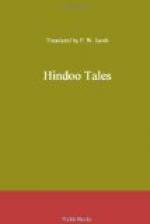* * * * *
ADVENTURES OF VISRUTA.
My Lord, as I was wandering one day in the forest of Vindhya, I met with a very handsome boy, standing by the side of a well, crying bitterly. When I asked what was the matter, he said: “The old man who was with me, when trying to get water from this well, fell in, and I am unable to help him. What will become of me?”
Hearing this, I looked down the well, which was not very deep, and saw the old man standing at the bottom, the water not being sufficient to cover him. By means of a long and tough stem of a creeper, I pulled him up safely; then using it again as a rope, with a cup made from the hollow stem of a bamboo, I drew water for the poor child, who was half dead with thirst; and finding that he was suffering from hunger also, I knocked down some nuts from the top of a high tree with a well-aimed blow of a stone.
The old man was very grateful for my timely assistance; and when we were all comfortably seated in the shade, he gave me, at my request, a long account of the circumstances which had brought him there, saying:—
“There was formerly a King of Vidarba remarkable for wisdom and justice, learned in the Scriptures, a protector of his subjects (by whom he was much beloved), a terror to his enemies, wise in political science, upright and honest in all his actions, kind to his dependents, grateful for even small services, and gracious to all. Having lived the full age of man, he died, leaving a prosperous kingdom to his son Anantavarma, a young man of great abilities, but caring more for the mechanical arts, music, and poetry, than for his duties as a ruler.
“One day, one of his father’s old counsellors in private addressed him thus: ’Sire, your majesty, with the advantage of royal birth, has almost every good quality that can be desired; your intelligence is very great; your knowledge superior to that of others; but all this, without instruction in political science and attention to public affairs, is insufficient for a king; void of such knowledge, he is despised, not only by foreigners, but by his own subjects, who, disregarding all laws, human and divine, at last perish miserably, and drag down their sovereign in their fall. A king who has not political wisdom, however good his eyesight may be, is regarded by the wise as a blind man, unable to see things as they are. I entreat you, therefore, to give up the pursuits to which you are so devoted, and to study the art of government. Your power will then be strengthened, and you may long reign over a happy and prosperous people.’
“To this exhortation the young king appeared to listen attentively; and said: ‘Such is the teaching of the wise; it ought to be followed.’




